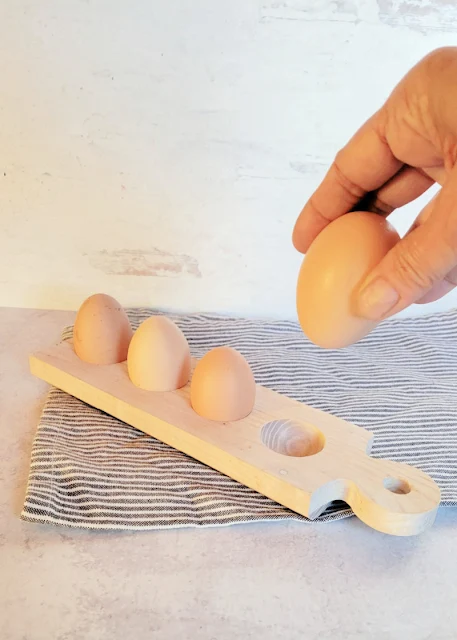Why Should Eggs Be Stored Pointy End Down?
You've probably heard that eggs should be stored with the pointy end facing downwards, but often wondered why? Or maybe you've not ever heard that and you're reading it here for the first time.
Either way, it's the truth. Eggs should be stored pointed end down.
But why? Well, I'll explain it to you.
Why Should Eggs Be Stored Pointy End Down?
Before I explain why eggs should always be stored pointy end down, let's back up a bit.
There's a Pointy End and a Blunt End on each Egg
When an egg is being formed and laid, there is a narrow, pointy end and a more rounded, blunt end.
As the egg travels down the oviduct, it travels pointy end first (and also spins, almost like a bullet travelling down the barrel of a gun, but that's a story for another day).
Just before the hen lays her egg, she stands up a bit in the nest, holding a squatting position, and the egg flips around so that it's laid blunt end first.
This makes for a better landing, more surface area for cushioning and less likelihood of the egg being broken as it exits the hen's body.
There's Also an Air Sac in an Egg
There is also an air sac at the blunt end of every egg.
It's this sac that an incubating chick embryo will use for air to breathe once its lungs are developed, but before it has hatched and is breathing outside air.
As an egg ages, whether fertile or not, the air sac will expand and get larger as air is allowed through the eggshell pores and moisture is allowed to escape.
There's a natural "bloom", an invisible coating, on the egg that helps prevent air and bacteria from entering the egg.
Preserving that bloom is one reason why eggs should not be washed until just before using them.
So back to the air sac.
Here's Why Should Eggs Be Stored Pointy End Down
As air and bacteria enter the egg through the pores in the eggshell, they encounter the egg white first, since the yolk stays anchored roughly in the middle of the egg by thin, ropy strands of protein called chalazae.
The egg white (or albumen) provides a layer of protection for the yolk - which is the more perishable part of an egg. Being alkaline, the white makes it difficult for any bacteria to thrive and grow inside the egg.
However, as an egg ages, the bacteria will move towards the nutrient-rich yolk where they can flourish. Also as the egg ages and the air sac grows, that air sac allows bacteria to move closer to the yolk.
When an egg is stored pointy end up, with the air sac at the bottom, that sac which is filled with air that is lighter than the egg yolk and white,will slowly rise and move towards the yolk, bringing any bacteria with it and risking contaminating the egg yolk.
That will increase the likelihood that salmonella or other bacteria will reach the yolk more quickly and contaminate the egg.
And there's the chance that the air sac will rupture and contaminate the egg with any bacteria it contains.
That will also hasten the 'aging' process of the egg, making it less 'fresh' since keeping the yolk completely enclosed within the white protects the yolk from drying out.
By storing the egg pointy end down, the air sac remains at the top of the egg (the blunt end) where it belongs. It's lighter than the egg contents, so safely sits on top. Also more of the white, which is mostly made up of water and from where moisture evaporates, is sitting in the carton and not exposed to quite so much air, and therefore loses moisture more slowly.
Another benefit to storing your eggs pointy end down is that if you're making deviled eggs, the yolks will be centered, which makes for easier eating and a more attractive deviled egg!
So to sum it up:
Do As I Say, Not What I Do!
That being said, I guess I don't always practice what I preach! Since we use our eggs so quickly and they are "coop to kitchen" fresh, I don't worry so much and usually keep a bowl of eggs on the kitchen counter, all topsy-turvy.
I do use those first though and then store the rest in the fridge. Pointy end down.
Go figure.
One final note: If you are collecting eggs for hatching, then storing them pointed end down until you are ready to incubate them is very important. Keeping the yolk and air sac in place and intact is critical for optimal hatchability.
References:
































